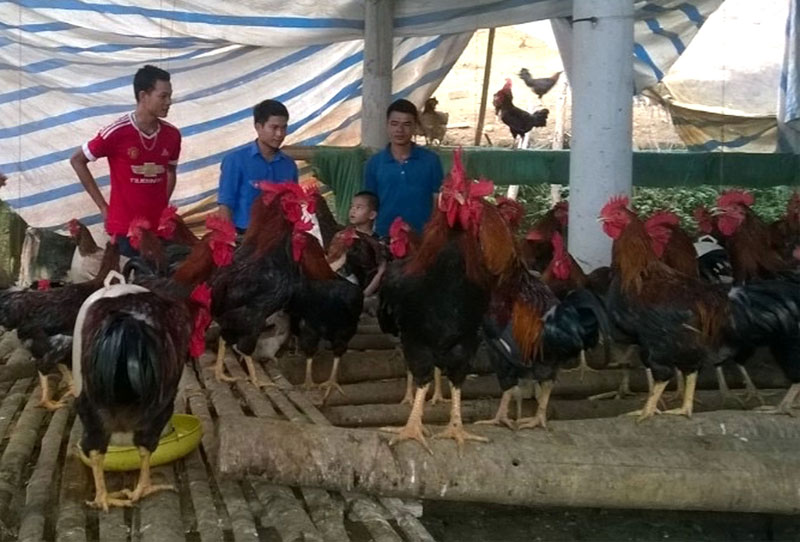
(HBO) – When arriving in Luc 3 village, Yen Nghiep commune, Lac Son district of Bac Giang province and asking about Bui Van Vi, you can get the answer from anyone with admiration. Not only being a dynamic secretary of the local chapter of the Ho Chi Minh Communist Youth Union (HCM CYU), he is also a role model for young people in doing business, reaping success in his hometown.
After spending time researching and
learning from effective household economic models, in 2010, with the support of
the local HCM CYU chapter, he borrowed money to build a farm growing wood trees,
sugar cane and cassava combining with raising fish and pigs.
Bui Van Vi said he met many difficulties
at the start, due to a lack of experience and technique, and limited market. However,
he was undaunted and continued to learn by joining training courses on new
scientific and technological advances, and participating
in programmes organized by the HCM CYU to
visit effective economic models.
At present, his farm has expanded to
more than 3 hectares of fish pond, 7 hectares of ironwood forest, 2 hectares of
cassava, more than 1 hectare of purple sugarcane and a pig breeding farm.
According to Vi, his farm creates jobs for 10 young people in the village with
an income of 2.5 to 3 million VND per person per month. Subtracting the cost,
each year, he earns from 300 to 400 million VND.

At the end of 2017, Bui Van Vi from Yen Nghiep commune
of Lac Son (first, left) expanded the scale of the farm by growing native
chickens, increasing income for his family.
In order to persuade local youngsters to settle
down in the home village, over the past years, the provincial HCM CYU chapter has implemented many activities,
focusing on providing vocational guidance and training as well as job
introduction, thus helping young people to rise out of poverty and improve the
living conditions for their families, contributing to local economic
development. In addition, being aware that the biggest difficulty for young
people when starting a business is capital, during 2012- 2017, the HCM CYU chapters at all levels in the province
cooperated with the Vietnam Bank for Social Policies to help young households access
preferential loans.
Pham Thi Ngoc Anh, deputy head of the Committee
for Youth Solidarity and Assembling said that currently, HCM CYU chapters in the province have helped 24,000 young families access loans worth nearly
562 billion VND through 667 credit groups. The provincial HCM CYU chapter also lent over 1.1 billion VND from the HCM CYU Central Committee’s job creation
fund to 32 business projects of local young people./.
More than just an information technology teacher, Bui Van Nien is an inspiring figure who has nurtured the scientific curiosity and creative spirit of students in Vietnam’s ethnic minority communities.
Da Bac is the most disadvantaged mountainous district in Hoa Binh province, with ethnic minorities accounting for about 90% of its population. Over the past years, the district has mobilised resources to implement ethnic policies to improve the quality of life of local people.
In recent years, Hoa Binh province has consistently prioritised the protection, care, and education of children, particularly those from ethnic minorities and disadvantaged backgrounds, by creating a safe, healthy, and nurturing environment for their all-round development.
The Steering Committee for Tobacco Harm Prevention and Control of Hoa Binh province, in coordination with the Tobacco Harm Prevention and Control Fund, held a ceremony on May 28 in response to the World No Tobacco Day (May 31) and the National No Tobacco Week (from May 25 to 31). The event was chaired by Nguyen Van Toan, Standing Vice Chairman of the provincial People’s Committee and head of the Steering Committee.
Since 2021, the Center for Industrial Promotion and Industrial Development Consulting (CIIDC) under the Department of Industry and Trade has been implementing a school lighting model as part of the plan for using energy efficiently and economically in Hoa Binh Province in the pẻiod of 2021 - 2025. This model not only aims to improve the learning conditions and enhance the education quality, but it also promotes the message of energy saving, energy security, environmental protection and contributes to the goals of socio-economic development.
In the 2024 - 2025 school year, the entire Hoa Binh provincial education sector includes 520 educational institutions and schools. Among them are 13 ethnic boarding schools with 153 classes and 4,487 students. Four of these schools have met national standards, reaching 30.7 percent.



